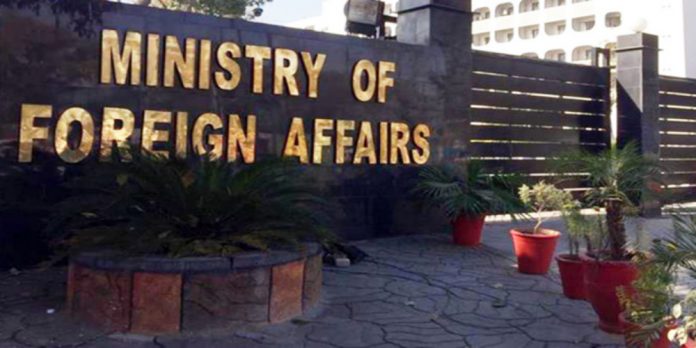—— MoFA statement also calls for global action against India’s rising majoritarianism and threats to mi-norities
By Asghar Ali Mubarak
ISLAMABAD: The Foreign Office (FO) on Monday condemned the construction and consecration of ‘Ram Mandir’ on the site of the demolished Babri Mosque in Ayodhya, saying that the temple “will remain a blot on the face of India’s democracy for the times to come”.
India’s Prime Minister Modi inaugurated the temple that embodies the triumph of his muscular Hindu nationalist politics, galvanising loyalists in an unofficial start to his re-election campaign this year.
Modi, in flowing golden-coloured traditional dress, unveiled the black stone idol of the deity Ram in the heart of the 50-metre temple, built on grounds where a mosque stood for centuries before it was torn down in 1992 by Hindu zealots incited by members of his party.
That demolition triggered the worst religious riots since independence — killing 2,000 people, most of them Muslims — and shook the foundations of India’s officially secular political order.
But for Modi’s ruling Bharatiya Janata Party (BJP), the opening of the Ram Mandir temple is a landmark moment in a decades-long campaign to align the country’s governance with its majority faith.
In a statement issued today, the FO said the developments of the last 31 years in India, leading to to-day’s ceremony, were “indicative of growing majoritarianism in India”.
“These constitute an important facet of the ongoing efforts for social, economic and political marginali-sation of the Indian Muslims,” it said.
“A temple built on the site of a demolished mosque will remain a blot on the face of India’s democracy for the times to come. Notably, there is a growing list of mosques, including the Gyanvapi Mosque in Varanasi and Shahi Eidgah Mosque in Mathura, facing similar threats of desecration and destruction,” the FO highlighted.
It added that the rising tide of ‘Hindutva’ ideology in India posed a “serious threat” to religious harmo-ny and regional peace. “The Chief Ministers of two major Indian states, Uttar Pradesh and Madhya Pradesh, are on record as citing the Babri Mosque’s demolition or inauguration of the ‘Ram Temple’ as the first step towards reclaiming parts of Pakistan,” the FO said.
It called on the international community to take cognisance of the “growing Islamophobia, hate speech and hate crimes” in India, urging the United Nations and other international organisations to play their part in “saving Islamic heritage sites in India from extremist groups” and protect the religious and cul-tural rights of minorities.
“Pakistan urges the government of India to ensure the safety and security of religious minorities, in-cluding Muslims and their holy places,” the FO statement concluded.
“The Lord has made me an instrument to represent all the people of India,” Modi said ahead of the “auspicious” opening, as he prayed at the feet of the human-sized statue, garlanded in flowers and draped in jewels.
Outside the temple, tens of thousands of chanting and dancing devotees waving flags, honking horns and beating drums, packed the streets of the northern town of Ayodhya, as military helicopters show-ered flower petals from the sky.
Few members of Ayodhya’s Muslim community were seen joining the jubilant street party, and oppo-sition leaders are reported to have stayed away.
Vijay Kumar, 18, took four days to reach the town after walking and hitchhiking 600 kilometres.
“We just wanted to be here,” Kumar said. “We just wish to see the temple before we leave.”
About 2,500 musicians are performing on over 100 stages for the crowds of pilgrims around the elabo-rate temple, built at an estimated $240 million that the project’s backers say was sourced from public donations.
The 140 kilometres between the town and Uttar Pradesh state capital Lucknow is a seemingly endless stream of billboards of blue-skinned Ram with bow and arrow — as well as of Modi and the region’s chief minister, the saffron-robed Hindu monk Yogi Adityanath.
“It’s all because of Modi,” said Prem Sharan, 35, a resident of Ayodhya.
“Some critics say that it is being turned into an election-like atmosphere; so be it. At least they are do-ing what they promised and one needs the power to do things for the people.”
Other attendees jetted into the newly built international airport and will stay at a crop of hotels built to cater to the millions of pilgrims expected to visit each year.
Among the celebrity guests due at the opening were Indian tycoons, former national cricket captain Virat Kohli and Bollywood titan Amitabh Bachchan.




